


















If you are wondering about the impact of agriculture on the State of Florida, and you should be, I’ve got some statistics for you. Last year I checked out information on Feeding the Economy (www.feedingtheeconomy.com) and I want to compare 2023 to 2024. It’s an upward trend for Florida and I’m excited about that.
In 2023, the total jobs listed for Florida were 2,875,202. In 2024, that number jumped to 3,044,456. The total wages were at $143.2 billion for 2023, and now that sits at $153.5 billion. Taxes hit $53.8 billion and that number is $73.1 billion in 2024. Exports were $5.7 billion and are now $5.9 billion.
Throughout the country, total jobs relating to agriculture jumped from 46,283,917 to 48,665,609. Wages went from $2.61 trillion to $2.8 trillion. The lone number that dropped is in exports, which were at $202.17 billion and now sit at 181.4 billion.
According to the Feeding the Economy study, “The 2024 report’s findings show that the total economic impact for the food and agriculture-related industries grew 11.8% over the last year, reaching $9.63 trillion. This represents 20.01% of total U.S. output.”
In addition, the website states, “From the 2020 Feeding the Economy report to now, food and agriculture manufacturing jobs grew at a faster rate than any other job category.”
As we know, struggles in agriculture are real. Farmers and ranchers are at the mercy of many things, the least of which is the weather. So, when shopping for yourself or your family, look for Fresh From Florida products. Let’s keep Florida trending in the right direction and support those who do so much for us.
Until Next Month
Sarah Holt

Greetings,
Fair season here in Hillsborough County has wrapped up with the 2024 Florida State Fair and Florida Strawberry Festival officially in the books. This year, The Florida Strawberry Festival hit the highest mark ever for attendees, and that included a one-day recordsetting tally. Records were also set in the Grimes building, with record sales supporting our youth livestock and plant projects. My congratulations extends to the many festival competitors and my thankfulness to the volunteers and buyers who helped throughout the festival.
This month, we will be hosting our spring session of Ag-Venture at the State Fairgrounds. This is an initiative that helps tell the story of agriculture to thirdgraders here in Hillsborough County and its importance to each of them, every day. Later this month, we will continue our focus on youth with our Youth Speech Contest. This year’s topic is “In addition to food and fiber, what other positive impacts in your local community can be attributed to agriculture?”
We recently hosted our first Ag tour of the season with Savannah Sipsy, U.S. Senator Marco Rubio’s Gulf Coast Regional Director. Keeping our legislators and their staff members up-to-date on the challenges facing our industry is a critical part of our mission.
I also wanted to highlight the Ag Census, which is a study done once every five years by the USDA, is
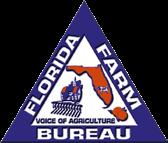
out. Some of the findings are alarming, particularly the loss of 140,000 farms over the last five years. Fortunately, the losses here in the Sunshine State have been minimal and our industry is continuing to shine as a pillar of our state. As the Voice of Agriculture, we are continually working to share the importance of agriculture and promote our “Fresh from Florida” products.
If you are not a Farm Bureau member, please consider joining so that you can help us advocate and educate on behalf of agriculture with our varied audiences. If you are a member, please volunteer at whatever level is practical for you. Please visit www. hcfarmbureau.org for more information about our organization, member benefits, and opportunities for engagement.
Thank you for your continued support of our industry.
Dennis Carlton, Jr.
Dennis Carlton Jr.
Dennis Carlton Jr. - President



The red-cockaded woodpecker or Leuconotopicus borealis as it’s known by its scientific name is a woodpecker endemic to the southeastern United States.
The red-cockaded woodpecker is a small to mid-sized species, being intermediate in size between North America’s two most widespread woodpeckers, the downy and hairy woodpeckers.
The red-cockaded woodpecker’s most distinguishing feature is a black cap and nape that encircles large white cheek patches. Rarely visible, except perhaps during the breeding season and periods of territorial defense, the male has a small red streak on each side of its black cap called a cockade, hence its name. The United States Fish and Wildlife Service lists the species as Endangered.
The red-cockaded woodpecker feeds primarily on ants, beetles, cockroaches, caterpillars, wood-boring insects, spiders, and occasionally fruit and berries. The vast majority of foraging is on pines, with a strong preference for large trees, though they will occasionally forage on hardwoods and even on corn earworms in cornfields.
Red-cockaded woodpeckers are a territorial, non-migratory, cooperative breeding species, frequently having the same mate for several years. The nesting season runs from April to June. The breeding female lays three to four eggs in the breeding male’s roost cavity. Group members incubate the small white eggs for 10–13 days.
Once hatched, the nestlings remain in the nest cavity for about 26–29 days. Upon fledging, the young often remain with the parents, forming groups of up to nine or more members, but more typically three to four members. There is only one pair of breeding birds within each group, and they normally only raise a single brood each year. The other group members, called helpers, usually males from the previous breeding season, help incubate the eggs and raise the young. Juvenile females generally leave the group before the next breeding season, in search of solitary male groups. The main predators of red-cockaded nests are rat snakes, although corn snakes also represent a threat.
Studies have also explored the possibility that southern flying squirrels might have a negative impact on red-cockaded woodpecker populations due to competition over cavities and predation on eggs and nestlings.
Historically, this woodpecker’s range extended in the southeastern United States from Florida to New Jersey and Maryland, as far west as eastern Texas and Oklahoma and inland to Missouri, Kentucky, and Tennessee.
By Libby Hopkins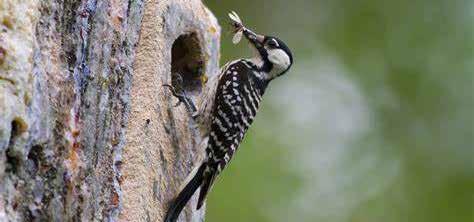
Today it is estimated that there are about 5,000 groups of red-cockaded woodpeckers, or 12,500 birds, from Florida to Virginia and west to southeast Oklahoma and eastern Texas, representing about one percent of the woodpecker’s original population.
They have become locally extinct in Kentucky, Maryland, Missouri, New Jersey, and Tennessee.
The red-cockaded woodpecker makes its home in fire-dependent pine savannas. Longleaf pines are most commonly preferred, but other species of southern pine are also acceptable. While other woodpeckers bore out cavities in dead trees where the wood is rotten and soft, the red-cockaded woodpecker is the only one that excavates cavities exclusively in living pine trees. The older pines favored by the red-cockaded woodpecker often suffer from a fungal infection called red heart rot which attacks the center of the trunk, causing the inner wood, the heartwood, to become soft. Cavities are generally excavated over one to three years.
The red-cockaded woodpecker suffers from habitat fragmentation when habitable pines are removed. When a larger cluster of birds gets split up, it is difficult for the young to find mates and eventually becomes an issue regarding species dispersal. While dispersing in search of new places to settle, the red-cockaded woodpecker encounters habitats of competing woodpecker species.
Due to the high importance of nesting habitat on the woodpecker’s reproduction, much management has been dedicated to creating ideal and more numerous nesting sites. Nesting clusters have been spared from forestry activity to preserve old-growth, large-diameter trees. The nesting sites themselves have also been managed to make them more appealing. The use of controlled burning has been used to reduce deciduous growth around nesting colonies. The redcockaded woodpecker has been shown to prefer nesting sites with less deciduous growth. The use of controlled burning must be exercised with caution due to the highly flammable resin barriers formed by the woodpecker.
In an effort to increase the red-cockaded woodpecker population, states such as Texas, Louisiana, Alabama, and Georgia’s wildlife management are creating artificial cavities in Longleaf Pine trees. There are two methods that wildlife management officers use to insert cavities in long leaf pines. The most respected and latest approach is to carve out a nesting cavity in the tree and insert a man-made rot-resistant wooden box with a PVC pipe small enough for only a red-cockaded woodpecker to fit through. These boxes, also known as “inserts,” can last up to 10 years. The older and less used approach is to drill a cavity into the tree in hopes that the birds will settle there and nest.











Back in 2020, Chase Richie of Riverview was a high school senior with the world ahead of him. He didn’t have an agriculture or farming background. “My senior year of high school we moved out onto my late grandparent’s 10-acre property,” Richie said. “Soon after I just started raising a few pigs and chickens and really enjoyed it.” Red’s Farm was born.
Richie wanted to start selling to the community and provide a pasture-raised product that they couldn’t find in the stores. “Fast forward four years later, we raise and sell pasture-raised Non-GMO chicken, pork, turkey, and rabbit,” Richie said. “We do home deliveries, go to several farmers markets, and even provide a few restaurants with our chicken.”
Richie, like many other farmers, is growing produce and raising livestock to start their own agriculture co-op.
There are many benefits to agriculture co-ops. They enhanced bargaining power. By pooling resources and working together, farmers within a cooperative can negotiate better prices for their produce, acquire inputs at lower costs, and secure more favorable terms with buyers. This collective strength helps level the playing field in the market.
They give access to resources. Cooperatives often provide members with access to essential resources such as seeds, fertilizers, and equipment. This accessibility can significantly reduce the financial burden on individual farmers and promote sustainable farming practices.
They give market opportunities. Agricultural cooperatives facilitate market access for small-scale farmers. They can collectively market products, explore new markets, and even add value to their produce. This can lead to higher income and a broader customer base.
They help with risk mitigation. By diversifying production and sharing risks among members, agricultural cooperatives help farmers manage the impact of adverse weather, market fluctuations, or other unexpected challenges.
They also offer knowledge sharing. Cooperatives are hubs for knowledge exchange. They provide training, information, and best practices that empower farmers to improve their skills and adopt innovative techniques.
Agricultural cooperatives are more than just business entities; they are symbols of unity and empowerment among farmers. Despite these challenges, agricultural cooperatives have proven to be vital in promoting sustainable agriculture, enhancing rural livelihoods, and strengthening farming communities.
By working together, farmers are better equipped to navigate the complexities of the agricultural sector and build a more secure and prosperous future for themselves and their communities. As a cornerstone of collaborative farming, agricultural cooperatives continue to play a crucial role in shaping the future of agriculture and rural development. (https://theagrotechdaily.com/the-role-of-agricultural-cooperatives/)
“What makes us different is that we are truly pastureraised and non-GMO fed,” Richie said. “Many labels in the store are misleading and don’t mean what people think they actually do. We also don’t give any antibiotics or hormones to any of our animals. We are very upfront with how our animals are raised and many people respect that and want to learn how everything is raised.”
Red’s Farm has gotten a lot of great feedback from its clients. “We have gotten only positive feedback from our customers,” Richie said. “Many of our clients have said they didn’t realize there was a difference until they tried it themselves, there is such a big difference in the quality and taste of our meat compared to storebought meat.”
If you ask Richie his favorite part of Red’s Farm, he’ll tell
you the process of farming. “I like being able to work for myself and grow,” Richie said. “I like to add improvements to the business and how we raise our animals and operate on our farm.”
Keeping things local is also important to Richie and his team at Red’s Farm. “Keeping things local is obviously an important thing to us as well, we like to support others and keep impacting the community around us with local collaborations.”
If you would like to learn more about Red’s Farm, you can visit their Facebook page at https://www.facebook.com/redsfarmfl or call 813-505-8222.
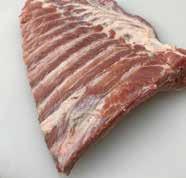

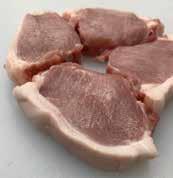
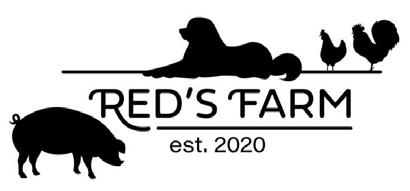





Last month’s cold fronts had the water temperature seesawing all over the place, which in turn, had the fishing unpredictable. One day, you might have a lot of action, the next day, not so much. Fortunately, the latest cold fronts haven’t been as severe, and the water temperature is warming up.
Soon more baitfish will inhabit most all of the grass flats making the morning chore of catching bait much easier. Then it will be time to rinse off your heavy deepwater cast net and put it away until next winter.
reason is they are still in season and the other, pound for pound, they are harder fighters than snook.
Redfish can be found throughout Tampa Bay, but some of the hot spots are around oyster beds and grassy areas adjacent to mangroves.
If you should see a few redfish as you’re moving about on the grass flats Power Pole down and start chumming with live baitfish. If they’re swimming with a school, they may very well start circling your boat and feed for an extended period of time. Do the same if you should encounter a school of mullet. Remember, redfish like to travel with mullet, so don’t assume it’s only a school of mullet. The bonnethead and blacktip shark action has been insane. On a recent morning charter with three teenage spring breakers, we caught 13 bonnetheads. On the same day, while fishing in the same spot during a different afternoon charter, we continued to catch numerous bonnetheads and some beefy blacktip sharks. One blacktip probably weighed close to 45 pounds.

Another factor that will improve the overall fishing experience is an end to the negative low tides we’ve been experiencing. The tides of early spring are so low at times it’s impossible to access many fishing spots until mid-to late day. For any snook fillet lovers out there, you have until the first of May to enjoy a delicious snook dinner, and then the season closes. Snook spawn from May through August and are protected from harvest during the mating process. Although you can still practice catch and release, I chose to pursue other species unless my current client has never caught a snook. Should you decide to still go after some of the large breeding females, please make sure you handle them properly when taking pictures. Never hold a large snook vertically for a photo. Always wet your hands and put your thumb in its mouth, grip firmly, and support the weight of the fish with your other hand while placing it under its stomach. Holding a large snook, or any other game fish, vertically for that matter is a death sentence. To learn more about the effects of mishandling fish, google “Cryptic Mortality.”
The redfish action really starts to pick up as the water temperatures rise, so I prefer to target them instead of snook. One
The cool thing about catching these sharks is I wasn’t just fishing for sharks. I was using light tackle that you would use on any grass flat, and also catching Spanish mackerel, seatrout, and sliver trout. Whenever I’m fishing for small sharks and Spanish mackerel, I use a 30-pound fluorocarbon leader and a size 1 or 2 long shank hook.
I find the best areas to catch the aforementioned variety of fish is in about five to seven feet of water. The bottom is usually a mix of hard shell, sand, and grass. To accelerate the action, I always start chumming with fresh-cut bait. As for bait on the hook, scaled sardines or shrimp work just fine. As a matter of fact, the morning we caught the 13 bonnetheads,
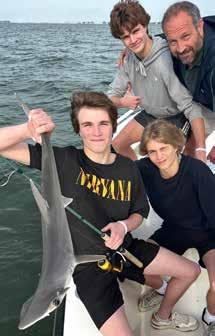

shrimp was the bait of choice. Never underestimate the allure of shrimp!
As we get further into May look for the mangrove snapper fishing to begin to pick up significantly. Mangrove snapper start staging up as we approach mid-to-late May, just ahead of the June through August spawning season. A good place to look for these tasty specimens is around bridge pilings and any of the numerous artificial reefs scattered throughout Tampa Bay.
Tarpon continue to filter into Tampa Bay, and by the first of May, they will be everywhere. The huge number of tarpon that move about between the Skyway Bridge and the passes on either side of Egmont Key is mind blowing! During May and June, the tarpon fishing rivals that of Boca Grande. The best part is you don’t have to deal with the crowds or that dreadful drive.
Afishionado, “Always an Adventure.”


Tampa Bay fishing guide Wade Osborne of “Afishionado Guide Services” has been plying the waters of Tampa Bay as a professional full-time captain, since 1997. Osborne has been featured on numerous TV and radio shows and writes for multiple publications. Osborne offers inshore fishing charters on light tackle spin, fly or plug. He also offers eco-tours with an emphasis on photography. For more info visit Afishionado.com or find Afishionado Guide Services on Facebook and Instagram. Email: wade@afishionado.com Call/Text 813-286-3474






Florida, Georgia, Indiana, Michigan, Mississippi, New Jersey, North Carolina, Oregon and Washington.
• Maintenance/Repairs
• CV Axles
• Drive Shafts
• AC Repair
GUARANTEED USED PARTS
• Large selection of Used Tires
• One cup of blueberries contains 80 calories, 3.6 grams of fiber and 25 percent of the recommended daily amount of vitamin C.
• Blueberries have high levels of antioxidants, such as anthocyanins – the compounds that color blueberries blue.

• A 2012 study suggested that eating at least one serving of blueberries a week slowed cognitive decline by several years.
• April 28th is National Blueberry Pie Day.
• Native Americans once called blueberries “star berries” because the blossoms make a star shape.

It seems the older I get the less I can remember. I have to keep a pad and pencil in my shirt pocket with my meeting dates and things to do for the day. Checking around I notice I am not alone with this problem.
I decide to wash my car. As I start toward the garage, I notice that there is mail on the hall table. I decide to go through the mail before I wash the car. I lay my car keys down on the table, put the junk mail in the trash can under the table, and notice that the trashcan is full. So, I decide to put the bills back on the table and take out the trash first, but then I think that since I’m going to be near the mailbox when I take out the trash anyway, I may as well pay the bills first. I take my checkbook off the table and see that there is only one check left. My extra checks are in my desk in the study, so I go to my desk where I find the can of Coke that I had been drinking. I’m going to look for my checks, but first I need to push the Coke aside so that I don’t accidentally knock it over. I see that the Coke is getting warm, and I decide I should put it in the refrigerator to keep it cold. As I head toward the kitchen with the Coke, a vase of flowers
on the counter catches my eye – they need to be watered. So I set the Coke down on the counter and I discover my reading glasses that I’ve been searching for all morning. I decide I’d better put them back on my desk, but first I’m going to water the flowers. I set the glasses back down on the counter, fill a container with water, and suddenly I spot the TV remote. Someone left it on the kitchen table. I realize that tonight when we go to watch TV, we will be looking for the remote but nobody will remember that it’s on the kitchen table, so I decide to put it back in the den where it belongs, but first I’ll water the flowers. I splash some water on the flowers, but most of it spills on the floor, I set the remote back down on the table, get some towels and wipe up the spill. Then I head down the hall trying to remember what I was planning to do. At the end of the day; the car isn’t washed, the bills aren’t paid, there is a warm can of Coke sitting on the counter, the flowers aren’t watered, and there is still only one check in my checkbook. I can’t find the remote, I can’t find my glasses, and I don’t remember what I did with the car keys. Then, when I try to figure out why nothing got done today, I’m really baffled because I know I was busy all day long and I’m really tired. I realize this is a serious problem, and I’ll try to get some help for it, but first
I’ll check my e-mail. Don’t laugh – if this isn’t you yet, your day is coming! And if I have sent this to you before….well, now you know why you’re getting it again.
Have you heard the story about the elderly woman that goes to the bar on a cruise ship and orders a Scotch with two drops of water? As the bartender gives her the drink she says, “I’m on this cruise to celebrate my 80th birthday today.” The bartender says, ‘Well, since it’s your birthday, I’ll buy you a drink. In fact, this one is on me.” As the woman finishes her drink, the woman to her right says, “I would like to buy you a drink, too.” The old woman says, “Thank you bartender, I want a Scotch with two drops of water.”
“Coming up,” says the bartender. As she finishes that drink, the man to her left says, “I would like to buy you one, too.” The old woman says, “Thank you. Bartender, I want another Scotch with two drops of water.”
‘’Coming right up,” the bartender says. As he gives her the drink, he says, “Ma’am, I’m dying of curiosity. Why the Scotch with only two drops of water?” The old woman replies, “Sonny, when you’re my age, you’ve learned how to hold your liquor. Holding your water, however, is a whole other issue.”
A young man saw an elderly couple sitting down to lunch at McDonald’s. He noticed that they had ordered one meal, and an extra drink cup. As he watched, the gentleman carefully divided the hamburger in half, then counted out the fries, one for him, one for her, until each had half of them. Then he poured half of the soft drink into the extra cup and set that in front of his wife. The old man then began to eat, and his wife sat watching, with her hands folded in her lap. The young man decided to ask if they would allow him to purchase another meal for them so that they didn’t have to split theirs. The old gentleman said, “Oh no. We’ve been married 50 years, and everything has always been and will always be shared, 50/50.” The young man then asked the wife if she was going to eat, and she replied, “Not yet. It’s his turn with the teeth.”
Lastly, a police car pulls up in front of grandma Bessie’s house, and grandpa Morris gets out. The polite policeman explained that this elderly gentleman said that he was lost in the park and couldn’t find his way home. “Oh Morris,” said grandma, “You’ve been going to that park for over 30 years! How could you get lost?” Leaning close to grandma, so that the policeman couldn’t hear, Morris whispered, “I wasn’t lost. I was just too tired to walk home.”

Caladium lovers around the world now have more choices with the introduction of 12 new cultivars over the past three years. Often referred to as the “geranium of the South” because of its popularity and versatility as both potted and landscape plants, caladiums actually enjoy global appeal.
Known by the common name elephant ear, as well as heart of Jesus and angel wings, there are over 1,000 named cultivars from the original South American/Amazon Basin plant. Caladiums are grown from tubers.
During their growing season, they require moderate watering and most varieties prefer partial to full shade, although sunresistant varieties are now in cultivation. Surprisingly, all caladium “bulbs” in stores in the world are from the Lake PlacidSebring area of Florida. The new varieties, available through breeding initiatives, are largely disease-resistant.
Caladium growers here in Florida work with Zhanao Deng, Ph.D., a plant breeder and professor of environmental horticulture at the University of Florida, Institute of Food and Agricultural Sciences Gulf Coast Research and Education Center (UF/IFAS GCREC) at Balm in southern Hillsborough County.
Deng and his colleagues have developed the new cultivars on experimental farms near the GCREC. Their work helps Florida growers, who are the global leaders in the production of caladium tubers. Most tubers are used to produce potted plants, while others are used directly for landscaping.
Deng characterizes the strengths of the new varieties as follows:
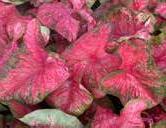
‘Limelite’ is characterized by a unique combination of leaf characters, lemon-yellow leaf background color and light pink blotches, making it a unique new addition to the fancy novelty caladium cultivar group. This caladium has excellent sunburn tolerance and leaf health.

‘Lava Glow’ produces many bright red to red-purple heartshaped leaves with excellent sunburn tolerance and resistance to leaf spot disease. This new variety is well suited for use in containers, small to large, and planted in landscapes from full sun to shady locations.
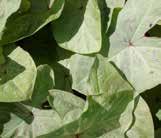
‘Rumbling Red’ is a new addition to the red fancy leaf variety group. This new caladium produces large heart-shaped leaves with a large red center and green margins.
‘Dots Delight’ is characterized by white main veins, multiple light pink spots, excellent tolerance to sunburn, and strong resistance to the leaf spot disease. It is well suited for use in the landscape, especially sun-
ny locations. In full sun, color contrast becomes intensified and leaves become even more attractive.
‘Pink Panther’ is characterized by a unique combination of leaf characters, long ruffled lance leaves, deep pink main veins, numerous light pink blotches, and robust upright petioles, which makes this variety an amazing addition to the pink lance group of caladiums.


‘Salsa’ is a new red lanceleaved caladium. Its leaves have a large red center and lightly undulated green margins. This variety has excellent leaf color display and performs well in containers and landscapes with excellent sunburn resistance and leaf health.
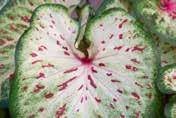
‘Crimson Skye’ produces many heart-shaped leaves with pink blotches.
‘White Lightning’ produces wide white lance leaves that perform well in shady locations in the landscape.
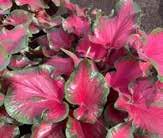
‘Wonderland’ features a compact plant stature and many white/creamy white leaves with a short petiole and brightly colored red to burgundy spots.


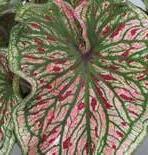
‘Spicy Lizard’ is a novel lanceleaved cultivar characterized by thick green main veins, multiple burgundy spots, excellent tolerance to sunburns, and strong resistance to leaf spot diseases. It is well suited for use in the landscape.
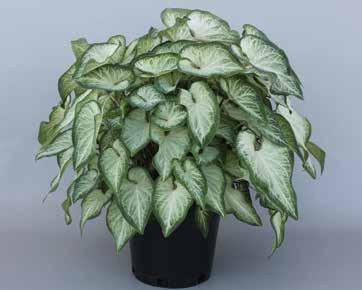
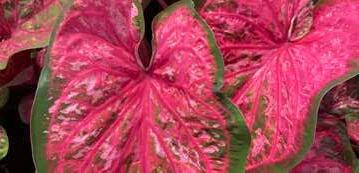
‘Pinky Swear’ is a new and distinct pink lance-leaved caladium. Its leaves are characterized by multiple prominent brightly-pink-colored veins and irregular light pink or green blotches. It is perfect for use in a range of landscape conditions, from full sun to shady locations.
In addition to these new varieties, Deng is now studying whether caladiums can be grown throughout the year, a research project funded by the U.S. Department of Agriculture (USDA) Specialty Crop Block Grant Program. This would enable Florida growers to serve a global market year-round, as well as make plants available in the winter months in the U.S., potentially enabling consumers to use caladiums for the holidays, including Valentine’s Day.
More information on the new caladium varieties is available by visiting:

• Bates Sons and Daughters (http://www.caladiumsonlinwe.com/)
• Florida Boys Caladiums (https://www.floridaboyscaladiums.com/)


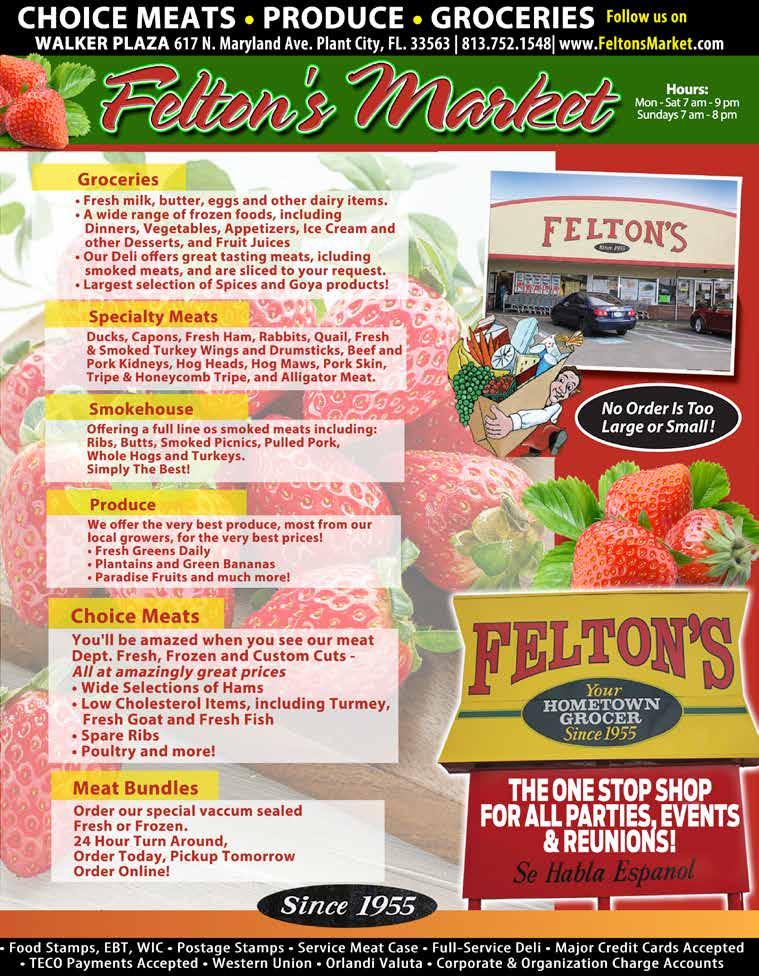


The Southwest Florida Water Management District’s (District) Governing Board has declared April Water Conservation Month. April is historically one of the driest months of the year and typically marks the peak demand season for public water suppliers.
The District is currently under a Modified Phase I Water Shortage through July 1, 2024, which prohibits “wasteful and unnecessary” water use and limits outdoor irrigation to one-day-per week in Hillsborough, Pasco and Pinellas counties.
The District is offering 10 simple tips to help you can lower your monthly water bill and do your part to save hundreds of gallons of water:
• Only run your washing machine and dishwasher when they are full.
• Use the shortest clothes washing cycle for lightly soiled loads; normal and permanent-press wash cycles use more water.
• Thaw frozen food in the refrigerator or microwave, not under running water.
• Scrape, don’t rinse, your dishes before loading in the dishwasher.
• Install high-efficiency showerheads, faucets and toilets.
• Check your home’s irrigation system for leaks.
• Turn off your irrigation system and only water as needed.
• Don’t leave sprinklers unattended. Use a kitchen timer to remind yourself to turn sprinklers off.
• Use a hose with a shut-off nozzle when washing the car.
• Consider installing a rain barrel with a drip irrigation system for watering your landscaping. Rainwater is free and better for your plants because it doesn’t contain hard minerals.
Leaks are the biggest water waster, both inside and outside of your home. You can use your water meter to check for leaks. Turn off all faucets and water-using appliances and make sure no one uses water during the testing period. Wait for the hot water heater and ice cube makers to refill and for regeneration of water softeners. Go to your water meter and record the current reading. Wait 30 minutes. (Remember, no water should be used during this period.) Read the meter again. If the reading has changed, you have a leak.
For more information about water conservation, please visit the District’s website at WaterMatters.org/Water101.





Place your order by May 3rd

Delivery: May 13th—May 17th Direct from the farm! “Super Sweet” Jumbo Size! Also available:

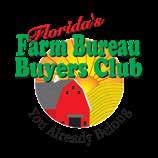


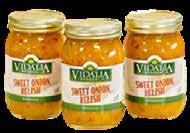



The Southwest Florida Water Management District (District) is reminding residents to check the timers on their irrigation system controllers as a result of daylight saving time changes.
The time change is also a good time to make sure irrigation system timers are set correctly to ensure that the systems operate consistently with year-round water conservation measures.
Know and follow your local watering restrictions, but don’t water just because it’s your day. Irrigate your lawn when it shows signs of stress from lack of water. Pay attention to signs of stressed grass:
• Grass blades are folded in half lengthwise on at least onethird of your yard.
• Grass blades appear blue-gray.
• Grass blades do not spring back, leaving footprints on the lawn for several minutes after walking on it.
For additional information about water conservation, please visit the District’s website at WaterMatters.org/Conservation.
The Florida Department of Agriculture and Consumer Services (FDACS) is currently conducting Food Safety and Modernization Act (FSMA) Produce Safety Rule inspections on behalf of the U.S. Food and Drug Administration (FDA). FDACS is offering two ways to prepare for these inspections:
• Grower training classes offered in partnership with the University of Florida, Institute of Food and Agricultural Sciences (UF/IFAS) at various locations statewide, and
• On-Farm readiness reviews, also conducted by FDACS and UF/IFAS
For more information, visit: www.FDACS.gov/FSMA.
University of Florida (UF) animal scientists have released a new survey aimed at gathering information from horse owners and professionals on their use of genetic tools. Horse aficionados, from industry professionals to hobbyists, are encouraged to take the survey to assist the International Horse Genome Project with setting new long-term goals.
The project includes more than 100 researchers across the globe. This survey will poll professional and hobbyist horse owners – everyone from feed store workers to horse business owners to equine fans – to gauge how they use equine genetics tools, such as health and performance panels.
The goal of the survey is to get ideas and feedback from various sectors on how they use current genetic testing tools and what critical needs exist that they want scientists to address, said Samantha Brooks, University of Florida Institute of Food and Agricultural Sciences (UF/IFAS) associate professor of equine physiology.
“Each of these groups brings a unique perspective that we want to include when we decide what our goals are going to be for the next five to 10 years,” she said.
The survey can be completed via: ufl.qualtrics.com.
The survey was created by UF/IFAS in collaboration with scientists from the Department of Veterinary Clinical Medicine at the University of Illinois Urbana-Champaign, the Department of Animal Science at the University of California-Davis, and the Department of Animal and Comparative Biomedical Sciences at the University of Arizona.
The Southwest Florida Water Management District (District) will be conducting prescribed burns April through June on the Lower Hillsborough Wilderness Preserve.
The Lower Hillsborough Wilderness Preserve is located south of Cross Creek Boulevard between U.S. Highway 301 and Bruce B. Downs Boulevard near Thonotosassa. Approximately 200 acres will be burned in small, manageable units.
Some major benefits of prescribed fire include:
• Reducing overgrown plants, which decreases the risk of catastrophic wildfires.
• Promoting the growth of new, diverse plants.
• Maintaining the character and condition of wildlife habitat.
• Maintaining access for public recreation.
The District conducts prescribed fires on approximately 30,000 acres each year.






That’s the BayCare effect. Where medical expertise meets timeless compassion.

When medical excellence is combined with empathy, it produces powerful results. It means never having to compromise on compassionate care. At BayCare’s new South Florida Baptist Hospital, located at 3202 North Park Road in Plant City, you can expect clinical expertise, combined with the use of advanced technologies, delivered by a team that treats you like family— it’s all right here.
■ Private inpatient and observation rooms: 146
■ Intensive care unit beds: 26
■ Emergency Department and Fast Track beds: 32
■ Interventional and cardiac catheterization suites: 3
■ Operating rooms: 8
■ A new Medical Arts Building that includes outpatient imaging and lab services
■ Expanded labor and delivery rooms, a mom and baby unit and a dedicated C-section surgery room
To learn more: NewSouthFloridaBaptist.org


Fresh Florida sugar snap peas are at their peak now in the early spring months. Also known as snap peas, they are eaten whole, pods, seeds, and all. The pods are tender and less fibrous than those of snap beans or peas. They grow well in moderately cool, moist climates and are a cross between snow peas and garden peas. The whole pod is eaten and has a crunchy texture and very sweet flavor. Sugar snap peas are sweet and crunchy and eaten both raw or cooked. The tender, round pods have crisp, thick walls with tiny tender sweet peas inside, unlike snow peas which have a flat pod with thin translucent walls. The main producers of sugar snap peas in the United States are California, Florida, New Jersey, and Hawaii, and can be grown in home gardens in many states.
Sugar snap peas are low in calories and are an excellent source of vitamins C, A, and K, and rich in iron. According to the United States Department of Agriculture (USDA) National Nutrient Database for Standard Reference, one cup of fresh sugar snap peas (98 g) contains 41 calories, 2.7 g protein, 0.2 g fat, 7.4 g carbohydrate, and 2.5 g of dietary fiber. It also provides 98% of the Daily Recommended Value (%DV) for vitamin C, 31% for vitamin K, 21% for vitamin A, 12% of manganese, 11% for iron, and 10% for thiamin and folate. Fresh Florida sugar snap peas also contain notable amounts of phosphorus, potassium, magnesium, and calcium.
Sugar snap peas are high in a variety of nutrients, including antioxidants, minerals, and vitamins that work together to promote a healthy heart. This legume boasts high levels of the antioxidants vitamins A and C, which work to reduce the amount of free radicals in the body and prevent their damaging effects in cells. By fighting cell and tissue damage, vitamin C may help protect against cancer and other diseases. Vitamin C is also important for a healthy immune system, cancer prevention, healthy blood circulation, and wound healing. This vitamin also helps the body absorb more iron and aids in the development of strong bones and teeth.
Sugar snap peas are also high in other important nutrients,
including potassium, magnesium, and folate. Potassium and magnesium work together to promote healthy heart functioning and lower high blood pressure. A healthy heart rhythm is influenced by these minerals. Potassium helps regulate fluids and mineral balance, aids in muscle contraction and helps transmit nerve impulses.
Choose firm, green pods that are free of blemishes and snap crisply when bent. Pick snap peas when pods have started to fill in and round. If left on the vine too long, the pods of snap peas become too fibrous and tough. Examine the pointy ends and avoid those that are wrinkly or shriveled. Snap peas are best eaten as soon as possible, but can be stored in the refrigerator for up to three or four days. They can also be blanched in boiling water and frozen to enjoy for later use.
Fresh sugar snap peas are delicious eaten raw, out-of-hand. They can be served with other raw vegetables with a dip or in any salad. They can also be boiled, steamed, roasted, or grilled. Snap peas are fairly delicate and are cooked for a very short time, to maintain its crisp texture.
Here are some more ideas:
• Boil in salted water until crisp-tender, about 1-2 minutes
• Stir-fry snap peas with teriyaki sauce and sesame seeds
• Toss raw or steamed snap peas into a salad
• Arrange on a crudité plate with raw carrots and cucumber
• Sauté snap peas with butter and sliced almonds for an easy side dish
• Toss into soups and stews
Enjoy fresh Florida sugar snap peas in their peak season today. With its crisp sweet flavor, you can boost your health and lower your risk of cancer by eating more delicious snap peas.
http://edis.ifas.ufl.edu/
http://www.whfoods.com
http://www.wikipedia.org
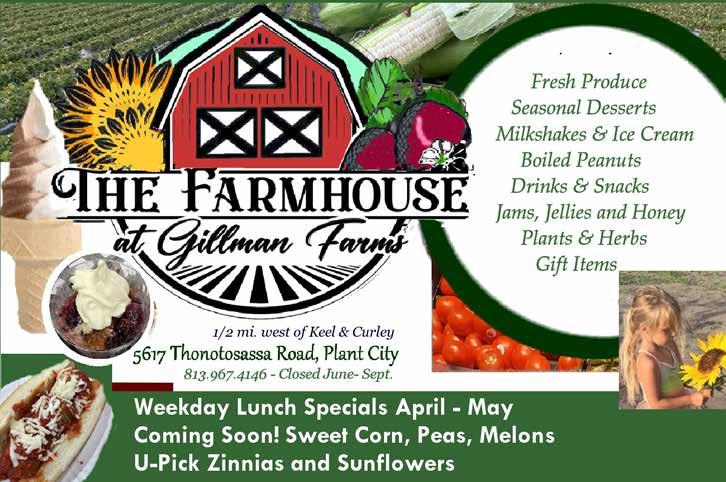




Russell’s proudly supports FFA & 4-H Active members receive in-stores every day!
10% OFF

*In-store only. 10% off regular priced items, cannot be combined with additional discounts.

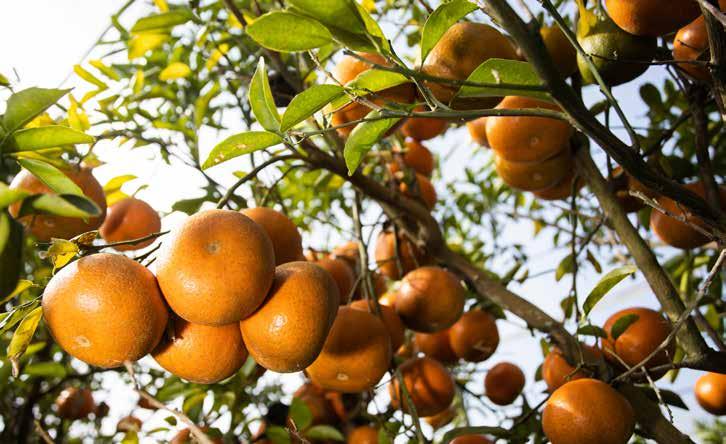
A significant portion of consumers are drawn to Florida’s iconic drink despite recent economic setbacks, a study of the state’s orange juice industry by University of Florida researchers reveals.
“There is an intrinsic value that consumers have for Florida orange juice. When they think of Florida, orange juice is often part of the imagery,” said Marisa Zansler, director of economic and market research with the Florida Department of Citrus and a co-author of an Ask IFAS document tracking OJ purchasing habits.
Researchers with the University of Florida Institute of Food and Agricultural Sciences (UF/IFAS) food and resource economics department followed the trajectory of 100% orange juice sales between 2018 and 2023, a period when the state’s citrus crops grappled with violent weather, a voracious bacterial disease and the highest inflation rates the country has experienced in more than 40 years.
Most surprising among the findings was the fluctuation in OJ prices over time, said Sungeun Yoon, an assistant research scientist with the UF/IFAS food and resource economics department. Sales of orange juice soared during the early days of the COVID-19 pandemic in 2020, increasing 16% in sales volume and 18% in dollar sales compared to 2019, ac-
cording to the document.
The researchers said consumers were likely influenced by the health benefits associated with the drink.
The “pandemic effect” began to fade in 2021, however, with OJ volume sales decreasing 7% and dollar sales decreasing 4% compared to the year before. At the same time, inflation was climbing, and the price of OJ eventually increased enough to keep retail dollar sales consistent with pandemic levels.
But prices kept rising, and a gallon of orange juice cost $8.82 by the first quarter of 2023, 14% higher than in 2022 when customers paid $7.77. For many consumers, the price proved too high and dollar sales correspondingly decreased 11% from $860 million to $765 million during that first quarter on a year-over-year basis.
The spread of Huanglongbing, or citrus greening disease, and damage from weather-related events like Hurricane Irma in 2017, Hurricane Ian in 2022, and a freeze in 2022 have also hurt the state’s citrus industry, Zansler said.
“These supply-side disruptions have had a profound and direct impact on the cost of production, leading to higher OJ prices,” Zansler said.

While all these factors have resulted in less orange juice sold and less revenue earned, the share of OJ consumers is relatively constant.
UF’s Florida Agricultural Marketing Research Center designed a consumer tracker survey to gain insight into shopping behavior and attitudes toward orange juice. By gathering data from 500 adult grocery shoppers every month, the tracker determined the percentage of active OJ consumers, defined as those who purchased the product in the past 30 days. That figure increased from 48% in 2021 to 51% in 2022 and remained constant during the first four months of 2023.
The tracker also revealed 60% of respondents queried since 2019 consider OJ a valuable food product, according to the document.
“It was reassuring to observe the relatively constant shares of consumers who purchased OJ in the past 30 days and who have a positive perception of OJ during the inflationary period,” Yoon said. “This signals the possibility of higher OJ demand once the OJ price level stabilizes.”
The mission of the University of Florida Institute of Food and Agricultural Sciences (UF/IFAS) is to develop knowledge relevant to agricultural, human and natural resources and to make that knowledge available to sustain and enhance the quality of human life. With more than a dozen research facilities, 67 county Extension offices, and award-winning students and faculty in the UF College of Agricultural and Life Sciences, UF/IFAS brings sciencebased solutions to the state’s agricultural and natural resources industries, and all Florida residents. ifas.ufl.edu | @UF_IFAS
Feeding a hungry world takes effort. Nearly everything we do comes back to food: from growing it and getting it to consumers, to conserving natural resources and supporting agricultural efforts. Explore all the reasons why at ifas.ufl.edu/food or follow #FoodIsOurMiddleName.

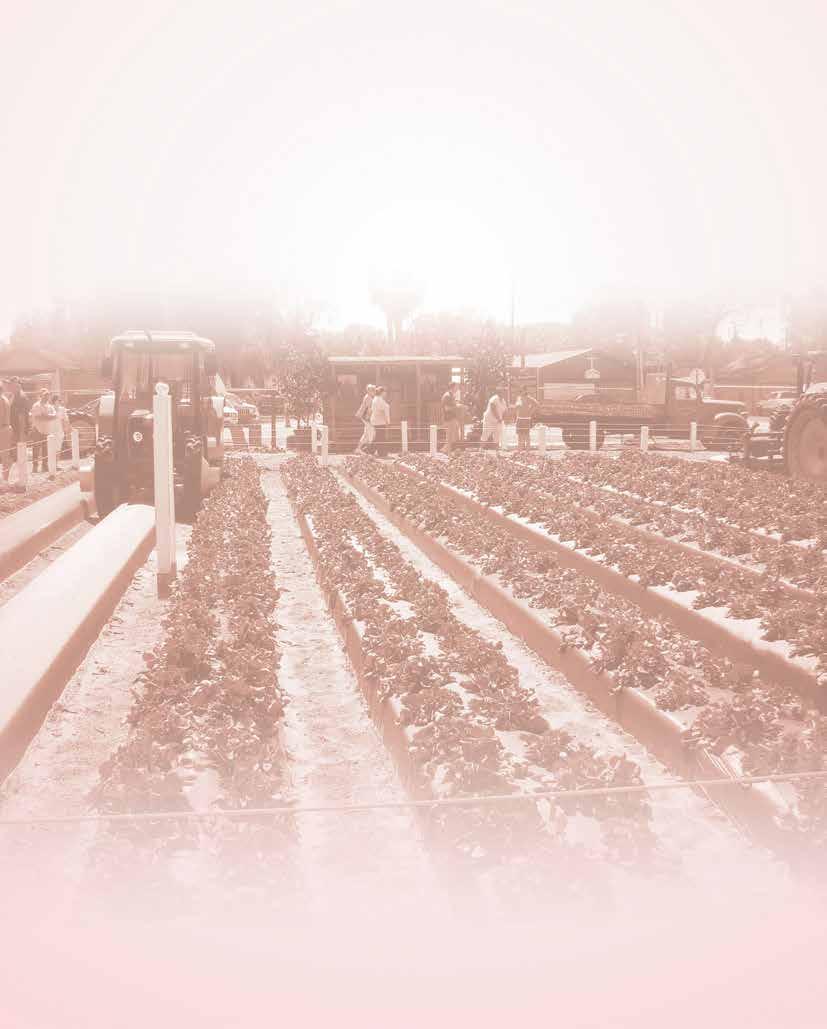
Mosaic Youth Steer Show
Patterson Co. Livestock
Arena Grimes Family Agricultural Center
Overall Grand Champion
Bella Ballard
Reserve Grand Champion
Kiah Swilley
Lightweight Division
Grand Champion
Kiah Swilley Reserve
Carter Manis
Middleweight Division
Grand Champion
Brielee Bedenbaugh
Reserve
Connor Scott
Heavyweight Division
Grand Champion
Bella Ballard
Reserve
Dakota Lapointe
Class 1
1st Kennedy Schrier
2nd Adrienne Campbell
3rd Jessie Parker
4th Alexandria O’Neal
5th Levi Sampson
6th Jackson Sturgis
7th John Paris
8th Emma Leiss
9th Bailey Svec
10th Hudson Brown
Class 2
1st Kiah Swilley
2nd Makayla Register
3rd RJ Christopher
4th Bailey Keys
5th Marlena Lott
6th Kaylee Hudson
7th Montana Campaomor
8th Sean Falvey
9th Chesnee Wink
10th Lyla Bent
Class 3
1st Carter Manis
2nd Madison Hurley
3rd Daniel Mink
4th Jayden McDaris
5th Carly Varnum
6th Haleigh Horner
7th Makinley Jensen
8th Camryn Lallemand
9th Mason Singletary
10th Shelby Lawrence
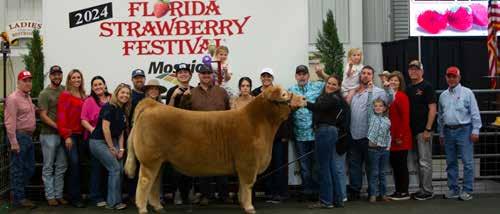
Class 9
Class 4
1st Caroline Crim
2nd Hallie Peacock
3rd Shalee Conrad
4th Kylie Devaun
5th Adriana Ursetti
6th Sarah Menendez
7th Jesus Gutierrez
8th Hannah Cook
9th Justin Zinke
10th Braxton Willis
Class 5
1st Kayla Hanson
2nd Jarrett Willis
3rd Chase Durrance
4th William O’Brien III
5th Annistyn Griffin
6th Marley Goodwine
7th Brody Bryant
8th Nicole Lietz
9th Bradlee Surber
10th Olivia Ennis
Class 6
1st Brielee Bedenbaugh
2nd Mia Peters
3rd Jenna Marvin
4th Emilee Taylor
5th Raeleigh Tilson
6th Brooke Wright
7th Nicholas Kouimanis
8th Lilly Devane
Class 7
1st Brady Manis
2nd Karoline Kmetz
3rd Gabija Davila
4th Halie Hinson
5th Kyndall Bass
6th Matthew Bell
7th Camden Staggs
8th Trentin Gilmore
9th Christopher Dudzinski
10th Joel Bender
Class 8
1st Connor Scott
2nd Brooklyn Ball
3rd Alli Taylor
4th Caden Shepherd
5th Teryn Boutte
6th Gavin Miller
7th Ella Connell
8th Joleigh Hinton
9th Brightyn Willis
1st Annslea Woody
2nd Colt Connell
3rd Kyndell Drawdy
4th Waylon Rogers
5th Austin English
6th Mason Howard
7th Kaleb Mathena
8th Lily Nance
9th Mya Salter
10th Justin Boyette
Class 10
1st Dakota Lapointe
2nd Tytan Gill
3rd Gabby Howwell
4th Kyslynn Mohn
5th Abigail Steward
6th Julia Jones
7th Ava Swindle
8th Tyler Peak
9th James Haynes
Class 11
1st Bella Ballard
2nd Delany Baird
3rd Kaylee Marsh
4th Caris Schneider
5th Alivia Knight

Class 7
1st Sophia Briel
2nd Jadyn Lyons
3rd Brylynn Newsome
4th Ciera Diaz
5th Evelyn Stolle
6th Reid Connell
7th Brooklynn Brewer
8th Kourtney Boyette
9th Ethan Carlin
Class 8
1st Makayla Mahoney
2nd Anna Lovell
3rd Addison Herlong
4th Mitchell Amole
5th Ivy Ogden
6th Jacob Ogden
7th Brooke Purcell
Class 9
1st Kaygenn Wood
2nd McKenzie Lincoln
3rd Hannah Rooks
4th Evelyn Vasher
5th Brody Mesa
6th Harrison Cornelius
7th Kayden O’Dell
8th Jackson Blanton
Junior Showmanship
1st Kaygenn Wood
2nd Evelyn Vasher
3rd McKenzie Lincoln
Intermediate Showmanship
1st Payton Flanagan
2nd Bristol Bedenbaugh
3rd Brooke Purcell
Senior Showmanship
1st Ashlyn Demanovich
2nd Ciera Diaz
3rd Tregg Aguero
Livestock Judging
Patterson Companies
Livestock Arena
Grimes Family Agricultural Center
Senior FFA
Sponsored by Mosaic
1st Suwannee FFA
2nd Durant FFA

Junior FFA
Sponsored by Mosaic
1st Deland Purple Middle
FFA
2nd Deland Gold Middle
FFA
3rd Turkey Creek Middle
FFA
4-H
Sponsored by Mosaic
1st Ring Raiders 4-H
2nd Reinhart Cattle Company
3rd Pasco Team 4-H
YLPA
Sponsored by Mosaic
1st Hillsborough YLPA
2nd McKeel YLPA
3rd Farm Fresh YLPA
High School Individual
Sponsored by Mosiac
1st Cooper Davis
2nd Brandy Manis
3rd Carly Varnum
Youth Plant Show
Sponsored by Choo Choo
Lawn Equipment
Swindle Family Pavilion
Grand Champion
Anna Steed Reserve
Kate Solomon
Woody Ornamental
Payton Flanagan
Foliage Plants
Brennan Jenkins
Hanging Baskets
Avery Palmer
Miscellaneous Plants
Ashley Jose
Liner Plants
Reagan Marchese
Edible Plants
Noah Steed
No. 1 Champion
Lillian King
No. 3 Champion
Lacey Merrell
No. 7 Champion
Jonathan Jose
Awards of Distinction
Noah Steed
Mackenzie Puerto
Christopher Dudzinski
Beef Breed Show
Patterson Co. Livestock
Arena Grimes Family
Agricultural Center
All Breeds GC Heifer
Shalee Conrad
All Breeds GC Bull
Kyndall Akins
Grand Champion Bred & Owned Heifer
Ansley Bryant
Reserve
GC Bred and Owned Heifer
Tucker Conrad
Grand Champion & Owned
Bull
Lillie Myers
Reserve Bred & Owned Bull
Hanna Lightsey
Grand Champion Angus
Heifer
Haidyn Young
Reserve Angus Heifer
Emily Cason
Grand Champion Brangus Heifer
Ashley Clark
Reserve Brangus Heifer
Mia McFate
Grand Champion Brangus
Bull
Kyndall Akins
Grand Champion Brahman
Heifer
Zibe Stein
Reserve Brahman Heifer
Jackson Oakes
Grand Champion Brahman
Bull
Bailey Skipper
Reserve Champion
Hanna Lightsey
Grand Champion Simmental Heifer
Shalee Conrad
Reserve Simmental Heifer
Maddox Sewell
Grand Champion Simmental Bull
Morgan Walls
Reserve Simmental Bull
Lillie Myers
Grand Champion Brahman
Heifer

Reserve Brahman Heifer
Joleigh Hinton
Grand Champion Commercial English Heifer
Ansley Bryant
Reserve Commercial English Heifer
Macyn Sewell
Grand Champion Charolais
Heifer
Evangelina Garcia
Grand Champion Hereford
Heifer
Adalyn Compton
Reserve Hereford Heifer
Richard RL Kiddy
Grand Champion Maine
Anjou Heifer
Raelan Sherouse
Reserve Maine Anjou Heifer
Carlie Shenefield
Grand Champion Maine
Anjou Bull
Morgan McCullough
Grand Champion Shorthorn
Heifer
Tucker Conrad
Grand Champion Shorthorn
Bull
Braydon Cranor
Grand Champion Santa
Gertrudis Heifer
Paige Blakenship
Grand Champion Ultrablack
Bull
Hannah Clayton
Grand Champion Beefmaster Heifer
Madilyn Nichols
Reserve Beefmaster Heifer
Rylee Leonard
Junior Herdsman
1st Morgan McCullough
2nd Adalyn Compton
Intermediate Herdsman
1st Cody Boynton
Senior Herdsman
1st Evangelina Garcia
2nd Jasmyn Billano
Junior Showmanshiop
1st Maddox Sewell
Intermediate Showmanship
1st Ansley Bryant
2nd Carlie Shenefield
Senior Showmanshiop

3rd Deland
Brady Manis
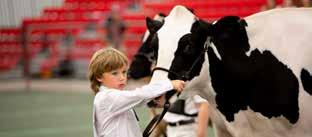
1st Shalee Conrad
2nd Raelan Sherouse
Bill McClelland Scholarship
Sponsored by the McClelland Family
Kaylee Hudson
Greenhand Award
Richard “RL” Kiddy
Jim Thompson Senior Award
Eduardo Martinez
Justin Gill Scholarship
Sponsored by the Gill Family
Shalee Conrad
Hicks Family Scholarship
Sponsored by the Hicks Family
Gabby Howell
Herb Granneman Award
Jadyn Lucas
Florida Strawberry Festival Scholarship
Sponsored by the Florida Strawberry Festival
Mattie Keeble
Mosaic Youth Poultry and Rabbit Show Poultry
Grand Champion
Ryan Bentrovato
Reserve Champion
Aubree Palmer
Champion Prodcution
Elijah Price
Champion Fancy
Sierra McCoy
Rabbit
Grand Champion
Noah Cruz
Champion Fancy
Noah Cruz
Reserve Grand Champion
Elizabeth Griffin
Champion Production
Rylee Eranen
Dairy Show
Patterson Companies Livestock
Arena Grimes Family Agricultural Center
Sponsored by Grove Equipment
Ayrshire Grand Champion
Brianna Shepard Reserve
Makayla Watson
Guernsey Grand Champion
Brianna Shepard Reserve
Rebecca Holcomb
Brown Swiss Grand Champion
Sarah Rogers Reserve

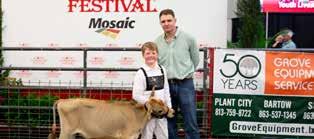
Sarah Rogers
Holstein Grand Champion
Anna Kock Reserve
Aleah Thomas
Jersey Grand Champion
Kyleigh Glenn Reserve
Rebecca Holcomb
Brown Swiss Senior Champion
Sarah Rogers Reserve
Sarah Rogers
Jersey Senior Champion
Kyleigh Glenn Reserve
Rebecca Holcomb
Ayrshire Senior Champion
Brianna Shepard Reserve
Makayla Watson
Guernsey Senior Champion
Brianna Shepard
Holstein Senior Champion
Anna Kock Reserve
Aleah Thomas
Ayrshire Junior Champion
Brianna Shepard Reserve
Makayla Watson
Brown Swiss Junior Champion
Colby Schibler Reserve
Sarah Rogers
Guernsey Junior Champion
Rebecca Holcomb Reserve
Rebecca Holcomb
Holstein Junior Champion
Jackson Raburn
Reserve
Adeline Allen
Jersey Junior Champion
Selah Allen Reserve
Charis Allen
Premier Exhibitor
Brianna Shepard
Junior All Breeds Bred-By Exhibitor
Brianna Shepard
Senior All Breeds Bred-By Exhibitor
Kyleigh Glenn
All Breeds Champion
Richard Kahelin
Junior Herdsman
Adriona Goodman
Senior Herdsman
Jaylene Carey
Junior Sportsman
Jacob Carey
Senior Sportsman
Andrew Hammer
Florida Strawberry Festival Junior Dairy Grant
Adriona Goodman
Florida Strawberry Festival Senior Dairy Grant
Jaylene Carey
Florida Strawberry Festival Dairy Scholarship
Abagail Michnowicz
Showmanship
Pee-Wee
Avery Dunn
Adult
Julia Jones
Costume Ball
Funniest
Jackson Raburn
Prettiest
Rebeca Holcomb
Most Original
Adeline Allen
Most Colorful
Ashley Lehnert
OVERALL
Selah Allen
Dairy Judging
4-H Junior Individual
Colby Holcomb
4-H Senior Individual
Abby Michnowicz
FFA High School Individual
Klytie Turner
4-H Junior Team
Kaylee Cloete
Morgan Cook
Colby Holcomb
Jacob Carey
4-H Senior Tam
Abby Michnowicz
Sean Falvey
Anais Degnan
Aubrey Cook
FFA High School
Wirlein Ortiz
Ashley Lehnert
Klytie Turner
Lamb Show
Patterson Companies Livestock
Arean Grimes Family Agricultural Center
Showmanship
Beginner
1st Elena Gutierrez
2nd Ada McNair
3rd Reece Patino
Junior
1st Adelyn Jensen
2nd Josie Clark
3rd Regina Gutierrez

Intermediate
1st Gracie Lopez
2nd Shelby Southerland
3rd McKenzie Paul
Senior
1st RileySilkworth
2nd Taylor Stewart
3rd Cooper Davis
Jumping
Short-Legged
1st Sarah Mendendez
2nd Autumn Brazil
3rd Reese Patino
Long-Legged
1st Serenity Keating
2nd Sophia Brownell
3rd Brooke Hier
Lamb Show
Overall Grand Champion
Riley SIlkworth

Grand Champion Black Face Ewe
Emma Leiss
Reserve Champion Black Face Ewe
Meredith Stewart
Grand Champion Black Face Ram
Hannah Rice
Grand Champion White Face Ewe
Adelyn Jensen
Reserve Champion White Face Ewe
Gracie Lopez
Grand Champion White Face Ram
Shelby Southerland
Grand Champion Crossbred Ewe
Lila Schmidt
Reserve Champion Crossbred Ewe
Emma Leiss
Grand Champion Rare Breed Ewe
Riley Silkworth
Reserve Champion Rare Breed Ewe
Anayeliz Rodriquez
Grand Champion Rare Breed Ram

Hannah Sevret
Reserve Champion Rare Breed Ram
Josianne Hanson
Costume Contest
Best Overall
Sophia Brownell
Funniest
Gracie Lopez
Most Original
Emily Berst
Most Elegant
McKinley Jensen
Brightyn Willis
Adelyn Jensen
Carson
Most Creative
Ried Patino
Most Colorful
Serenity Keating


 by John Dicks
by John Dicks
Earlier this year, just by chance, I came across a bargain. For a short period of time, Annual Passes to Florida State Parks were on sale at half price!
Probably because our state coffers were overflowing with a budget surplus, it was a grand idea to give some back, encouraging us to enjoy what is promoted as the Real Florida. To visit for half price all 175 of our parks was way too enticing for my very frugal mindset to simply let go.
The discount made my Annual Family Pass only $60! Yes, it’s now twice that, but still, it gets a total of eight people, entering as a group, a day’s entrance to all of them for a year.
There are two exceptions to the 8-person entry with the Annual Family Pass. One is for Weeki Wachee Springs State Park, and the other is for Homosassa Springs Wildlife State Park.
Both of them offer unique infrastructure for getting you below the surface of the water to get a fish-eye view of life in the spring. Of course, too, Weeki Wachee has daily shows of those Mermaids cavorting underwater, which always delights the crowds!
Other than those two, here’s a few of my favorite parks close to home:
Alafia River State Park (14326 S. County Road 39, Lithia) - Right down the road for most of us, its claim to fame is the radical elevation changes in its topography. With what started as a reclaimed phosphate mine, it’s become a hotspot for mountain bikers who love the scenic biking trails with hills and drops rarely found in the flat lands of Florida.
Popular, too, with horseback riders who like the variety of terrain, it has 20 miles to explore of hilly trails through forests and flat woods with lakes to stop by and just chill.

If you care to camp, but prefer to not to pitch your own tent, there’s even Glamping available which gives you, for a fee, a night under the stars sleeping on a memory foam mattress, along with a fan, cooler, kitchen station, grill, and fire pit!
Hillsborough River State Park (15402 U.S. 301 North, Thonotosassa) - Along with the seven miles of hiking trails, the park is mostly known for its rare (in Florida) Class II river rapids. They make for an interesting, if not exciting, canoe or kayak trip along the scenic river.
Glamping opportunities are also available, as is just regular camping. It also offers an interesting hands-on history lesson through exploring onsite the Fort Foster State Historic Site, which is a reproduction of the fort originally built there in 1836.
Myakka River State Park (13208 State Road 72 Sarasota) - This is a huge state park, encompassing some 58 square miles! There’s plenty of room for boating, fishing, hiking, and camping. Flowing through the park, the Myakka River was Florida’s first designated wild and scenic river. With its vast expanse of unspoiled wetlands, prairies, and hammocks, it’s revealing what the Real Florida once actually looked like.
Unique to the park is the very popular Myakka Canopy Walkway. Completed nearly 25 years ago, it’s the first public treetop trail in North America. A short walk through the trees 25’ above the ground gives a birds-eye view of life in the trees. It also includes a taller tower, 74 feet in the air, presenting spectacular views of the immense park.
170 More - Obviously I’ve just scratched the surface, so to speak. Surely, the state parks of Silver Springs pop up in your mind as a great one, as does Rainbow Springs. So, too, for anyone who went to went to school at the University of Florida, Ichetucknee Springs, always conjures up fond memories.
Time is fleeting. Go visit some of Florida’s State Parks!

This month our activity is a mushroom based craft that can help you get rid of small scraps of leather, or if your new to leather work, this is a great opportunity to get creative with inexpensive scrap leather pieces. Leather foliage can be a great addition to your home décor and last for a long time. Mushrooms are perfect for such a craft because the natural color of leather is very similar to that of wild mushrooms and is easy to distress for texture and color variation.
Materials:
2 oz – 4 oz Leather Scraps (Veggie Tan)
Scissors
Fabric glue
Hot Glue
Sewing machine (or needle & thread)
Felt
Rubber bands
Plastic Easter Eggs (optional for molding leather)
Soak Leather; 5 to 10 min to soften it for forming and distressing
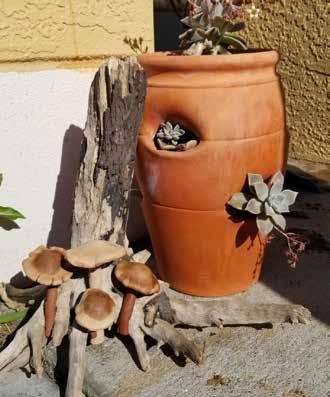
Distress Leather: Twist, Bruise, Scratch, Scorch (Bake 100 °f to get blotchy darkening) I kept mine in the oven until they started to burn.
Mold Leather Tops: make the leather concave by forming with your hands or stretching into a mold. I used both halves of plastic Easter eggs for small mushrooms.
Mold Leather Stems: Roll strips of damp leather into a tube shape. (inside out for texture) Glue the edges with fabric glue, Tighten rubber bands around the stem until the glue dries.
Trim Leather Tops: Trim the molded leather to create a round(ish) top. Imperfections look more realistic.
Glue Felt: Glue felt onto the bottom of the mushroom top
Glue Stems; Remove rubber bands from the stems. Hot Glue the stems to the inside of the mushroom top
Finish; Glue your mushrooms into a setting of wood, or a picture frame, a diorama. Etc. Decorate the setting with moss, rocks, dead leaves, etc…
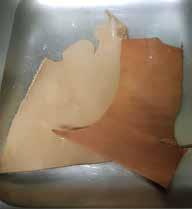



Do you believe that the spores of a mushroom can infiltrate the body to create a zombie? A zombie is a creature that’s mind and body are characteristically controlled by an infection that forces it to wander among the masses that are doomed to become zombies themselves before dying and infecting the rest of the population. Books, movies, and video games often explore concepts that foreshadow future possibilities. Although zombification is popular science fiction for human beings, it is a bizarre reality for many insects. This month we will take a closer look at the fungi responsible for creating zombie ants, they are closer than you think.
On a recent hike through Dead River Park in Thonotosassa, I noticed a carpenter ant (Camponotus) clinging to a patch of Spanish moss. When I looked closer, I realized this was no ordinary ant, at least not anymore. This was what is known as a zombie ant, easily distinguished by its death grip on foliage and a fungal stalk growing out of its neck. Chris Kiddy, the program coordinator for Hillsborough County’s Conservation and Environmental Lands Management Department was at the park setting up one of the camping events offered to the public. I showed Chris the zombie ant and explained what happened to it before suggesting his campers might enjoy seeing it and he could have fun with the zombie reference. Chris did share the zombie ant with the campers and later told me they were fascinated with the sighting, especially the teenagers; furthermore, campers soon discovered that it was not the only zombie ant to be found.
The zombie apocalypse genre dates to at least 1954 when Richard Matheson created the zombie-vampire novel I am Legend. Since then, there has been an increasing interest in the zombies in the Science Fiction and Fantasy genres of literature, film, and video games. While some of these books and movies include the premise of a viral infection, the actual cause of zombification is still a mystery with hunches ranging from NASA radiation to divine intervention. There is however a game plot based on real science.
The Last of Us, a third person survival horror action adventure game released in 2013, features a plot in which 60 percent of humanity is wiped out by a mutant parasitic fungi Cordyceps, which happens to be a real-world organism. This organism was a featured segment of the BBC nature documentary Planet Earth (2006) and was the inspiration for the core game concept developed by Bruce Straley and Neil Druckman of Nauty Dog for the Sony’s Playstation 3 and Playstation 4. The game explores the notion of a real-world fungus evolving to infect human beings.
Cordyceps is a generic term that describes a genus of ascomycete (sac fungi) that spew spores from a sac like fruiting body. Recently renamed Ophiocordyceps, fungi in this genus include hundreds of species that parasitize various insects, not human beings, however, human beings have been consuming Cordyceps for thousands of years. The caterpillar fungus (Ophiocordyceps sinensis) for example, parasitizes the larvae of various Asian ghost moths (Hepialus) in Asia and is revered as an Asian herbal medicine traditionally selling for the equivalent of $500 to $1,300 an ounce. Caterpillar fungus typically has high levels of heavy metals such as arsenic that are potentially toxic and as such, have been heavily regulated since 2016. A variety of products are now marketed and sold as Cordyceps in North America.
The fungi responsible for the ant zombies is Ophiocordyceps unilateralis, a fungus that parasitizes carpenter ants (Camponotus) and closely related species. The fungi depend on the ant host to survive and need specific conditions for optimal growth and propagation. Humidity must be 94-95 percent with temperatures between 68°F and 86°F. Spores attach to the outside of the ant’s exoskeleton and begin germination to grow long branching structures that secrete compounds that dissolve their way through the insect’s outer shell (cuticle). Once the cuticle is breeched, the fungi continues to grow on the inside of the insect’s body producing new compounds that change the insect’s circulatory system, behavioral characteristics and even replaces ant tissue with its own tissue as it grows. The infected ant first suffers severe convulsions that make it fall to the ground away from its peers and the infection takes complete control of the ant’s body, keeping the brain intact, but controlling the ant’s limbs. The infection drives the ant back up the stem to a precise height of 25.20 cm (± 2.46 cm) above the ground, always on the northern side of the plant, and always just above a busy foraging path of the colony. The infected ants last exertion will be its “death grip” on the underside of a leaf or Spanish moss with its mandibles as it dies, the fungi makes a meal of what is left of the ant’s body, replacing the ant’s innards with it’s own and eventually sprouting a fruiting body from just behind the ants head. The fruiting body matures and erupts to release spores onto the rest of the colony foraging below to begin a new cycle of infection. A successful infection can lead to as many as 30 dead ants per square meter, each of them with a death grip at precisely the right height and conditions for the fungi to grow and propagate.
I contacted the only zombie expert I know, my 9-year-old

niece Avril Simon Collazo of Chalmette, Louisiana. According to her, she knows “every single thing about zombies” and she described what she knew of zombie ants. Her initial comment was simple and to the point, “The fungus goes into the ant’s brain and makes the ant go onto a leaf until one day the fungus bursts out of the brain;” She continued, “It cannot happen to human beings though.”

When we talked about “cordyceps,” the fungal assailant in the video game The Last of Us, and I told her they are sold as herbal remedies, my little expert warned “DO NOT EAT THAT!” I suggested that it may reverse the infection in zombies, she disagreed, explaining “they probably wouldn’t swallow it since it wouldn’t be human flesh, they would probably spit it out like it’s a kid eating broccoli.”
“Humans turn to zombies by a virus,” she explained “The virus is pretty close to bone cancer and rabies” and clarified “If cancer and rabies were people and they had a child, that’s what the zombie virus would be, the infection transfers when you get bitten or scratched by a zombie. When you die, your brain dies, and that’s when the virus turns your brain back on and makes you into a zombie, and you have no control, you don’t remember anything and all you know is to feed.”
I sent Avril my picture of the zombie ant to get her opinion and she said she would look at it and reference her zombie book because it had a section for zombie ants. After reading to me several pages of zombie history, she confirmed that her book mentions examples of “zombies” in nature, specifically with the fungus of the genus Ophiocordyceps. So, there we have it, the spores of a mushroom can indeed infiltrate the body to create a zombie, although for the time being, it’s only the body of insects. The conditions are right for you all to witness this amazing natural phenomenon, remember, if you find one zombie ant, you are likely to find an entire horde, if you take a closer look.





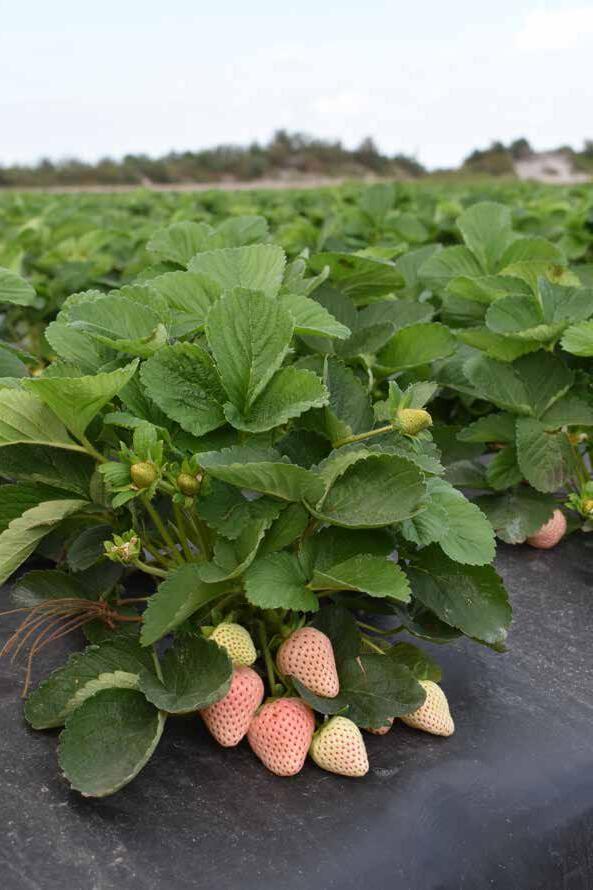

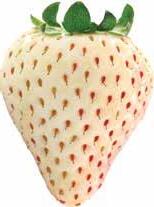
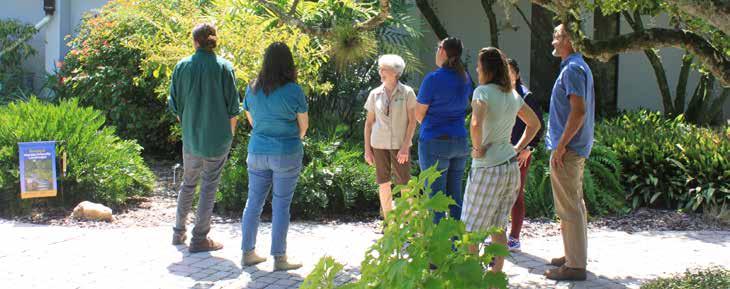

Are you interested in gardening? What about recycling and composting? Want to save water or know more about drought-tolerant plants? Do you have an hour to learn something new that is beneficial to the environment?
If you answered yes to any of the above questions, we have a great suggestion for you. Check out our county’s calendar of events. Each of the 67 counties in Florida has a University of Florida/Institute of Food and Agricultural Sciences Extension office. Upcoming programs are listed on the calendar with registration links. https://ifas.ufl.edu/extension-calendarevents/
Many are free. Some have a small fee.
Hillsborough County upcoming events:
Triple Workshops: Composting, microirrigation and rainwater harvesting workshops are offered monthly from February through October on the first Saturday of the month. Learn how to create your own soil amendments and save water by using a microirrigation kit and rain barrel. Attend one, two or all three. Compost attendees receive a compost bin, kitchen bucket and compost thermometer. Microirrigation attendees will take home the traditional micro kit, a rain gauge and hose timer. Rainwater harvesting attendees will receive a food-grade barrel that has been drilled and spigoted, while learning how to use the water and on which plant materials. Reference materials are provided to attendees for each of the presentations, and there is a drawing for giveaway items at the end of each class.
Vermicomposting (composting with worms): Find out how to create the bin, what these specialty worms eat and how to harvest the castings. The nutrient-rich worm byproduct works very well in any garden, and you can make your own worm tea for watering plants…not drinking!
Vegetable Microirrigation: This kit is a great addition to your vegetable garden. You will learn how to connect the kit to a hose bib and appropriately water vegetables.
Patio/Container Microirrigation: It works well for patio, container and hanging plants. This kit can connect several pots/containers on your patio, lanai or front porch.
While not necessarily an upcoming event, we also offer inground irrigation evaluations (over the telephone or in person) for high water users, defined by more than a 20,000 gallons per month average over the past year. Contact Will Stone: stonew@hcfl.gov
For more information on environmental horticulture, contact the University of Florida/Institute of Food and Agricultural Sciences (UF/IFAS) Extension Hillsborough County, 813-7445519, visit our office at 5339 County Road 579, Seffner, FL 33584, or website, calendar of events and Facebook pages.
Lynn Barber is the Florida-Friendly Landscaping TM agent for UF/IFAS Extension Hillsborough County. Contact her at labarber@ufl.edu.
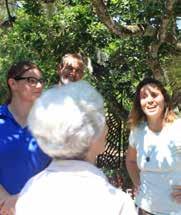


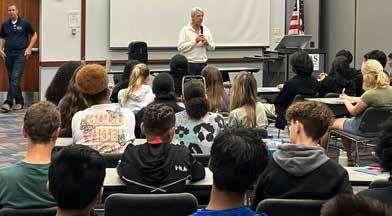


The University of Florida, Institute of Food and Agricultural Sciences (UF/IFAS) Gulf Coast Research and Education Center (GCREC) recently hosted the 2024 Youth Ag Expo. The event was “designed to introduce students to the world of agriculture and science through engaging activities,” said GCREC Media Specialist Alice Akers and one of the organizers.
One hundred and forty students from three schools – Barrington Middle School, Tomlin Middle School and RCMA Wimauma Community Academy - participated in the daylong event along with 20 chaperones. During the Expo, student rotations of approximately 30 minutes each included:
DNA: Strawberry Extraction Lab
Greenhouse Tour/Artificial Intelligence (AI) in Agriculture Plants Get Sick Too! (visit to the GCREC Diagnostic Clinic) Visit with School and Industry Representatives
Organizations and individuals at the Expo, which gave attending students an introduction to the world of agriculture and science through engaging activities, included: East Bay High School FFA; Durant High School FFA; Don Rainey, UF/IFAS Extension Water Resources Specialized Agent; Andrea Dunlap, UF/IFAS Ona Range Cattle Research and Education Center

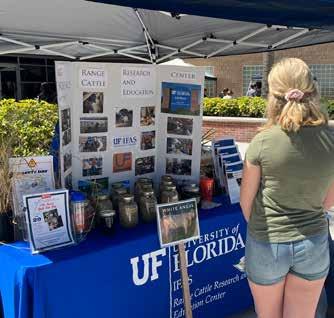
staff member, and Jason Steward, academic advisor at the UF/IFAS College of Agriculture and Life Sciences Plant City campus.
Lunch was provided to the participants.
The GCREC has as its mission “to develop and disseminate the science and technology to sustain agriculture and technology to sustain agriculture and conserve natural resources in Florida and beyond.” Current goals and priorities for the Center include:
* Develop novel crops and production strategies that address resiliency, sustainable intensification and urbanization
* Fully conceptualize and establish the new AI Center at the GCREC
* Increase applied research capacity, and increase communications and outreach
In addition to Akers, Expo organizers included Marissa Cassaway, a biological scientist at the Center, and Steward with assistance from the Gulf Coast Postdoc and Student Association, as well as other volunteers from the Center, which is located on a 475-acre site in southern Hillsborough County at Wimauma.
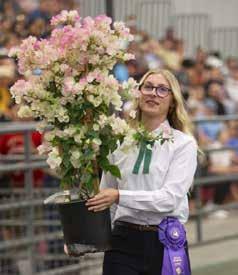
The grand champion of plants, Anna Steed, was chosen recently at the Florida Strawberry Festival’s Youth Plant Show in the Swindle Family Pavilion. The Youth Plant Show is sponsored by Choo Choo Lawn Equipment and offers youth in the community an opportunity to raise a plant, enter it into competition, and sell it at the Youth Plant Sale.
Steed’s inspiration to start raising plants came from her father. “My dad has always promoted growing plants and learning about plants in our family,” Steed said. “He taught us a lot about showmanship, sending out buyer let-
ters and finances, so we could make a little money while we are in school.”
This was Steed’s seventh and last year for showing plants because she is a senior at Strawberry Crest High School. “Going into this, I was not expecting to win Grand Champion,” Steed said. “The weather the day of judging just totally cooperated because my bougainvillea were in full bloom. They looked absolutely gorgeous.”
Steed kept up with her bougainvillea all season. “They almost died once, but they came right back with the weather,” Steed said. “My dad said they look like they can be winners and the next day when we came back to the Festival they had a Grand Champion Ribbon on my bougainvillea.”
In addition to the grand champion and reserve grand champion, additional category winners were selected. Payton Flanagan exhibited the champion woody ornamentals; Brennan Jenkins exhibited the champion foliage plants; Avery Palmer exhibited the champion hanging baskets; Ashley Jose exhibited the champion miscellaneous plants; Reagan Marchese exhibited the champion liner plants and Noah Steed exhibited the champion edible plants.
If you ask Steed what she liked most about showing
Kaygenn Wood is 10-years-old and lives in Lithia, Fla. She is a student at Pinecrest Elementary School is currently the Florida Strawberry Festival’s Mosaic Youth Swine Grand Champion. “I got into raising swine when I was four years old,” Wood said. “My sister was the one who first started showing swine and I just kind of followed her after she showed swine at the Strawberry Festival. The first year I showed at the festival, I won showmanship.”
You could say raising swine is a family tradition. Wood has two older sisters and they have competed and won various titles in showing swine. “I love when they are little and so playful,” Wood said. “I feed them marshmallows when they are babies. As they group up, I just stay focused on raising them and what God has in store for me and I’m happy with whatever I get in the competitions.”
Wood was surprised and very happy when she won Grand Champion for Swine this year at the festival. “I was very happy winning but I also felt happy for all the other kids who won as well. Their wins were well deserved because we all worked very hard for the competition.”
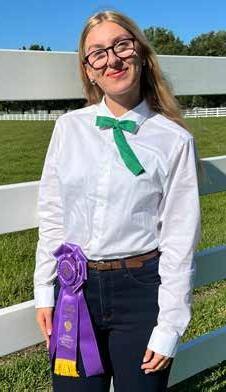
she will tell you the people. “I really loved learning about the plants and growing them, but the day at the auction and meeting all the people was really fun and definitely my favorite part.”
Steed plans to major in biological sciences once she graduates from Strawberry Crest High School.

Wood’s grand champion swine was purchased by RAOK Boutique and
Comer Tools for $30 per pound. In total, 73 exhibitors sold their pigs in the sale where no exhibitor earned less than $10 per pound. “Our community is amazing,” said Florida Strawberry Festival President Kyle Robinson in a release. “So many came to the Festival’s swine sale to support youth in agriculture. Due to the hard work of our FFA, 4H and YLPA students, and the generosity of our livestock buyers, the sale totaled more than $322,000. This money will be a great asset to our youth exhibitors as it will be used to further their education and propel them into the future.”
All livestock shows and the swine sale and steer sale take place in the Patterson Companies Livestock Arena.
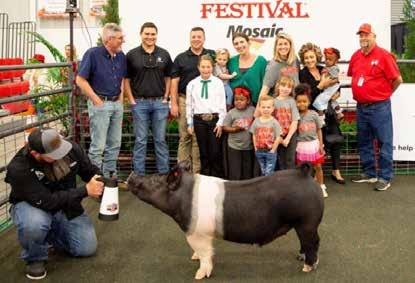
The grand champion and the reserve grand champion at the Florida Strawberry Festival’s Mosaic Youth Steer Show were chosen recently at the Patterson Co. Livestock Arena in the Grimes Family Agricultural Center.
Bella Ballard, 13, a member of the Youth Leaders in Production Agriculture Chapter, exhibited the overall grand champion steer. “I started showing steers when I was 8 years old,” Ballard said. “My dad got me into raising and showing steers because he used to raise them and show them when he was younger. I fell in love with it and just kept showing them.”
In the show, each steer is placed in one of ten classes based on the animal’s weight. Classes one through three comprise

the lightweight division, classes four through six comprise the middleweight division, and classes seven through ten comprise the heavyweight division. “I’m just very competitive,” Ballard said. “I’ve won back-to-back years at the festival.”
According to the contest rules, if an exhibitor has shown a Grand Champion twice at the Florida Strawberry Festival Mosaic Steer Show and Sale, he/she will be ineligible to participate as an exhibitor in the steer show and sale again. “It felt great to win again but yet bittersweet because I can’t show steer anymore but I may show a heifer or a swine next year if I get drawn for a heifer or a swine,” Ballard said. “I love being a part of the festival and showing animals.”
Exhibitors in the Mosaic Youth Steer Show sold their steer in the Mosaic Youth Steer Sale at the Patterson Companies Livestock Arena. Ballard’s steer was purchased by West Coast Enterprises, Enhanced Healthcare and Drop the Walls Boutique. “My steer was sold for $25 per pound,” Ballard said. “I was so happy that my steer sold for such a good price.”
Ballard wants to become a veterinarian when she finishes school and college.
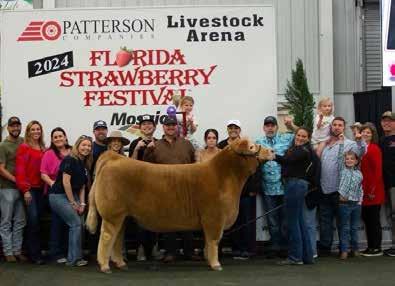









This publication is supported by the Food and Drug Administration (FDA) of the U.S. Department of Health and Human Services (HHS) as part of a financial assistance award U2FFD007446 totaling $1,166,732 with 100 percent funded by FDA/HHS. The contents are those of the author(s) and do not necessarily represent the official views of, nor an endorsement, by FDA/HHS, or the U.S. Government.












UF/IFAS can do more for agriculture in Hillsborough and Polk County in the next five years than in almost any other moment in more than a century of scientific support for farmers.
I’ll work hard on your behalf to make the most of this moment as the new UF interim senior vice president for agriculture and natural resources and head of UF/IFAS.
As soon as former Senior Vice President Scott Angle was appointed provost and I was granted the privilege of leading UF/IFAS, I was on the job in Tallahassee working to secure state support for an artificial intelligence in the agriculture center to be built in Hillsborough County.
That support can propel our efforts to deliver technology to your farm in ways that are affordable, accessible, and easy to use. Our planned Center for Applied Artificial Intelligence in Agriculture will serve the entire state but be based at the Gulf Coast Research and Education Center in Balm.
I also traveled to Washington almost immediately in search of agency and congressional support for agricultural science. I am pleased to continue Florida Strawberry Growers Association leader Kenneth Parker’s service as a Florida delegate in the national group of land-grant university advocates who travel to DC to testify to the impacts of federal funding.
I hope to meet many of you in the months to come – the people who produce Florida’s food, feed, fuel, and fiber. Your voice is vital to shaping science.
My title is new but my commitment to farmers goes back decades. I spent years as a researcher in the field listening to growers. My time as chair of the Department of Agronomy – the science of seeking maximum yield from an acre of soil -- brought me valuable perspective.
I saw how much growers’ field observations and partnership with our researchers contribute to discovery during my five years as dean of UF/IFAS research.
With global competition, labor challenges, adverse weather events, disease, and urban sprawl all making it harder to farm in Hillsborough and Polk counties, now is the moment for a strong connection with UF/IFAS.
We’re on the threshold of technological advances we see only once in a generation. I’ll be asking you what problems should be prioritized to address using this new technology.
Please invite me to your farms and your meetings. Let me know how I can serve. Let’s be partners in making the most of the tremendous opportunities that lie ahead.
Rob Gilbert is the University of Florida’s interim senior vice president for agriculture and natural resources and leader of the UF Institute of Food and Agricultural Sciences (UF/IFAS).


Staffed with bankers who have deep roots in the Plant City area, our bank’s focus for 40 years has been to serve owner-managed businesses, professional firms, and families that want a strong, local connection with their bank and banker. Come grow with us.


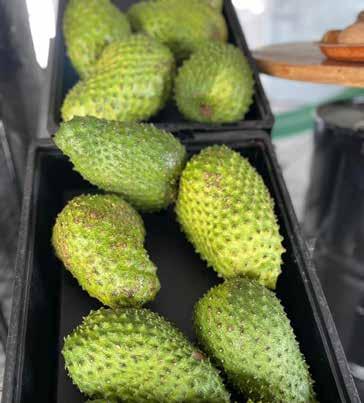
Established in 2019, Long View Family Farm’s mission is to provide its customers with the freshest, highestquality produce and tropical plants. They are committed to sustainable farming practices that protect our land and animals for future generations. They believe that by supporting local agriculture, they can help build stronger and healthier communities by providing fresh tropical produce and plants to future generations. “My husband, Long Thai, and I have four sons and one daughter, along with our new grandson,” said Thuy Dinh. “We moved from Massachusetts in 2005 due to job relocation. After 10 years, my husband transitioned from the IT world to investing in a farm.”
The Long View Family Farm is located in Lithia. In 2018, the family purchased a 32-acre property to kick-start an Asian vegetable business. “While the initial partnership did not work out, my husband, leveraging his IT background, delved into growing tropical trees as the start of Long View Family Farm,” Dinh said. “Despite limited experience, he expanded with the help of online resources and local farmers, beginning with Hass avocados and a variety of Indian and Thai mango trees. Progressing to include passion fruit, sugar apples, longan, and other tropical delights.”
In 2024, the family launched a fruit stand with support from our son, Kevin, who promotes their farm through social media and their website. “He plays a crucial role in enhancing our farm's visibility by collaborating with

local farms and managing our advertising efforts,” Dinh said. “We use sustainable farming practices to ensure that our crops are healthy and free from harmful chemicals. We're proud to be serving our local community.”
If you ask the family what makes their farm different from other farms in the area, they will tell you it’s their farming practices. “We believe that sustainable farming practices are essential for the health of our planet and our customers,” Dinh said. “That's why we use natural fertilizers, crop rotation, and other sustainable practices to grow our produce. Every tree on our farm is carefully chosen for its unique characteristics. Our mangoes are hand-selected for their exceptional taste and being fiber-free. Moreover, we prioritize using manure to nurture our trees.”
Long Thai takes immense pride in the farm, ensuring that each plant is strategically positioned and wellcared for. “We delight in witnessing the growth alongside our children and our beloved 6 dogs, who are integral to our family unit,” Dinh said. “Customers value our dedication to cultivating high-quality fruits and supporting local produce. When certain products are unavailable, we collaborate with local farmers like Diane from Eagles Hammock Farm for eggs and other neighboring Asian growers for unique items.”
Keeping things local is very important to Long View Family Farm. “For us farmers to prosper locally, com-
munity backing is vital,” Dinh said. “With rising operational expenses, consumer preference for local goods over imports is essential. We also advocate for governmental support to sustain the expansion and diversification of tree varieties. A heartfelt gratitude to our patrons and local farmers. Promoting health through consuming locally sourced fruits and vegetables is imperative for our well-being and the longevity of local agriculture in the United States. Shout out to local farmers supporters.”
If you would like to learn more about Long View Family Farm and the different types of produce they offer, you can visit their website at www. longviewff.com or their Facebook page at www. facebook.com/LongViewFF. You can also call Long View Family Farm at 508-335-8098. The farm is located at 16975 County Road 672 in Lithia.
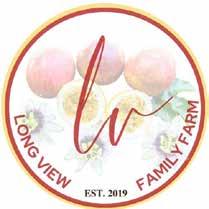



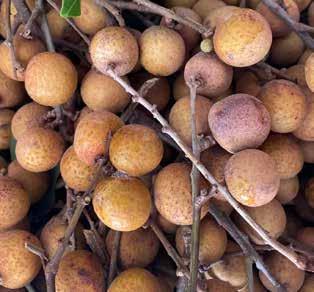
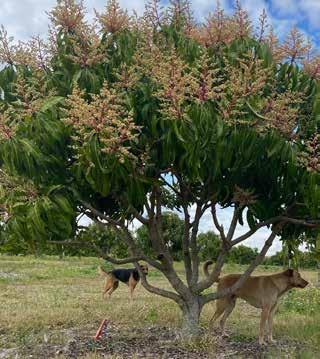

Florida Blueberry Breakfast Casserole

2 cups fresh Florida blueberries, rinsed and dried
1 loaf bread (your favorite kind)
4 ounces low-fat cream cheese (cold so it can be cubed)
8 large eggs, beaten
1 ½ cups low-fat milk
1/4 cup maple syrup
1/4 cup butter, melted
Nonstick cooking spray
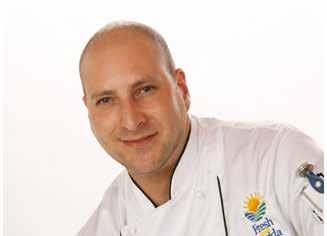
Preheat oven to 350 degrees F. Cut bread into 1-inch cubes. Cut cream cheese into small cubes. Lightly spray a 9x9x2-inch baking dish. Place half of the bread cubes in the dish. Evenly place the cream cheese cubes and 1 cup of the blueberries over the bread. Add the remaining bread cubes and blueberries to the top of the casserole. In a medium-sized bowl, combine eggs, milk, maple syrup and butter. Slowly pour egg mixture over bread. Cover casserole with foil and bake for approximately 45 minutes. Insert a toothpick in the center of the casserole; when it comes out clean, remove the foil so the casserole can brown on top. Let cool slightly and serve warm with extra maple syrup on the side.

Blueberry Biscuit Cookies
Ingredients:
1 cup Florida blueberries
1 cup Florida pecans, chopped
1/2 cup Florida honey, divided
2 tablespoons low-fat milk
2 cups biscuit mix
Preheat oven to 350 degrees F. In a large mixing bowl, combine biscuit mix, blueberries, pecans, and milk. Mix well and add enough of the honey to make the mixture stiff like cookie dough. Place dough by tablespoonful onto a greased baking sheet about 2 inches apart. Bake until edges begin to brown, about 15 minutes. Remove from oven and drizzle remaining honey on each cookie. Bake an additional 5 minutes and serve immediately.


BUILDING SUPPLIES
METAL ROOFING
Thousands of 8ft. & 10ft. sheets. In Stock. Prices from $6 and up. Custom lengths available. 813-752-7088 ask for Ferris
ALUMINUM
We have all your aluminum needs! Screen Room, carports & awnings. Call Blake (813) 752-3378
WINDOW SCREENS
We make window screens of all sizes available in different frame colors. Call Ted 813-752-3378
CABINETS
All wood kitchen cabinets. All wood vanities. Custom made to your size. Call Chris 813-752-3378
VINYL SIDING
Many colors and styles to choose from. Ask for Ted. 813-752-3378
MOBILE HOME SUPPLIES
Everything you need under ONE roof! Call Blake 813-752-3378
NEW, USED & ABUSED.
CALL FOR A WINDOW QUOTE.
We are a MI Windows dealer. Our windows are energy star, lifetime warranty. Call Broke & Poor 813-752-3378
LAWN EQUIPMENT/ SUPPLIES
USED ZERO TURN
Zero turn mowers, several to choose from. Call Alvie 813-759-8722
52" cut. $2,500 Call today! Ask for Alvie 813-759-8722
2016 GRAVELY PRO STANCE
52 Stand on mower. $2,500 Call 813-759-8722 Ask For Alvie GRAVELY PRO STANCE
FARM EQUIPMENT
I4 POWER EQUIPMENT
Trade-Ins Welcomed, Service Department Available. Exit 22 • S. Frontage Rd. Plant City 813-752-4459
JOHN DEERE
Looking for your new tractor?
Come see us at Everglades Farm Equipment. evergladesfarmequipment.com 2805 SR 60 West, Plant City 813-737-1660
NEW “LEFT OVER” MASSEY FERGUSON 2606H 65hp tractor. Loader, 4x4, manual shutter transmission, hydraulic remotes. $38,850. Call Alvie 813-759-8722
2018 MAHINDRA EMAX 22G
Mahindra tractor. Low hours, 4X4, with loader. $10,900. Call Alvie 813-759-8722

NEW 2023 BAD BOY BANDIT
750 UTILITY VEHICLE
4x4, liquid cooled EFI engine, power steering, dump bed, roof, 2-piece windshield, winch, mirrors, 2-year limited warranty. $14,975.00. Financing available WAC. Call 813-759-8722 Ask for Alvie.
2019 MAHINDRA 1626
Tractor-loader-backhoe, 4x4, hst transmission. Runs and works good. $19,500. Call Alvie 813-759-8722
2021 BOBCAT UV34XL
Six passenger 4x4 utility vehicle. Very good condition. $12,500 Call and ask for Alvie today! 813-759-8722
2021 MASSEY FERGUSON GC1723E
22.5 hp ,4x4 tractor with loader. Good condition. $12,000.00 Call Alvie 813-759-8722
BUSH HOG 3210
10.5' rotary cutter. Ready to work. $7,500 Call Alvie 813-759-8722
MECHANIC NEEDED
Agricultural equipment. Pay with benefits based on experience. Call David 863-537-1345 or Alvie 813-759-8722
PARTS COUNTER HELP
Wanted for parts look up and sales. Experience in the agriculture equipment service. Speak with Alvie. 813-759-8722
OLD ANTIQUE BLUE STOVE
Bread warmer, chrome trim. You have got to see it to believe it!
Call Ted for more details. 813-752-3378
DOORS & WINDOWS SPECIAL ORDER
No upcharge. House & Mobile Home. Many standard sizes in stock. Ask for Blake. (813) 752-3378
KITCHEN CABINETS & VANITIES
Get quality all wood cabinets for less than the BIG Box STORES! Call Today! Ask for Blake. (813) 752-3378
OVERSTOCK SPECIAL
Barn doors starting at $80.00 Call Ted 813-752-3378
MISC.
FREE Wooden Shipping Pallets
All sizes! Call Alvie 813-759-8722
24 HOUR SERVICE
Coggins Plumbing licensed • bonded • Insured. www.cogginsplumbing.com 813-643-7173
FARM BUREAU INSURANCE
We have you covered! Call us today. 813-752-5577
ALAN’S AIR CONDITIONING
Residential, Commercial Sales SVS & Repair. Legendary service for over 20 years! 813-752-0821
SHOWER STALLS - FIBERGLASS
Scratch and dent shower stalls - fiberglass perfect for hunting camps. $150 you pick! Call us! 813-752-3378

Our PRF specialists are trained to help you analyze complicated insurance data so you:
• Protect your land and livelihood against potential losses during times of drought.
• Make the most informed decision for your business.
• Very affordable – Government subsidized
• Premiums are not due until October 1
• No adjusters needed
• No claim forms
• Protects your cash flow
“Anyone can sell you a policy. But CKP invests the time to understand your individual needs and develop a strategy that will produce the best coverage results.”
